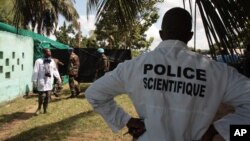ABIDJAN —
Ivory Coast has begun exhuming dozens of mass graves containing bodies from the country’s 2010-2011 post-election violence. At a ceremony in Abidjan’s Yopougon district on Thursday, officials said the process would provide closure to families and help bring perpetrators of crimes to justice.
A government census has identified 57 graves for exhumation in the commercial capital of Abidjan, and many of those are believed to contain multiple bodies. A national census of mass graves has yet to be conducted, but officials have said the exhumation effort will eventually extend throughout the country.
The violence in Ivory Coast was triggered by former President Laurent Gbagbo’s refusal to step down after losing the November 2010 presidential runoff vote to his rival, current President Alassane Ouattara. More than 3,000 people died in five months of fighting, according to the United Nations.
On Thursday, Justice Minister Gnenema Coulibaly presided over a ceremony at the site of the first grave to be exhumed. The grave is located on the grounds of a mosque in Yopougon, and contains the bodies of four men who were killed in an attack on the mosque in April 2011.
Coulibaly said exhumations of hastily dug graves were an important part of moving on from the conflict.
“Two years after this tragedy, many bodies remain at rest in public spaces, including places of worship,” he said. “It’s absolutely necessary to proceed with exhumations to allow families to grieve, and to permit judicial investigations to find the truth.”
Coulibaly said that 36 of the 57 graves identified for exhumation were located in the Yopougon district, a part of the city where fighters loyal to both Gbagbo and Ouattara allegedly committed killings on a large scale, according to reports from journalists, rights groups and the U.N.
Issiaka Diaby, president of the Collective of Victims in Ivory Coast, said it was difficult for residents of the district to embrace reconciliation when their dead relatives had not been properly laid to rest.
“The exhumation of these bodies is a very good thing, because it was not easy for the parents to come to this mosque and pray when their relatives were buried just outside,” he said. “And when you think about cases where bodies were buried in houses and other places, the exhumation process will reduce the suffering of their parents and also reduce the desire for revenge.”
The ceremony on Thursday included prayers led by Muslim and Christian leaders, as well as a moment of silence for victims of the fighting.
A government census has identified 57 graves for exhumation in the commercial capital of Abidjan, and many of those are believed to contain multiple bodies. A national census of mass graves has yet to be conducted, but officials have said the exhumation effort will eventually extend throughout the country.
The violence in Ivory Coast was triggered by former President Laurent Gbagbo’s refusal to step down after losing the November 2010 presidential runoff vote to his rival, current President Alassane Ouattara. More than 3,000 people died in five months of fighting, according to the United Nations.
On Thursday, Justice Minister Gnenema Coulibaly presided over a ceremony at the site of the first grave to be exhumed. The grave is located on the grounds of a mosque in Yopougon, and contains the bodies of four men who were killed in an attack on the mosque in April 2011.
Coulibaly said exhumations of hastily dug graves were an important part of moving on from the conflict.
“Two years after this tragedy, many bodies remain at rest in public spaces, including places of worship,” he said. “It’s absolutely necessary to proceed with exhumations to allow families to grieve, and to permit judicial investigations to find the truth.”
Coulibaly said that 36 of the 57 graves identified for exhumation were located in the Yopougon district, a part of the city where fighters loyal to both Gbagbo and Ouattara allegedly committed killings on a large scale, according to reports from journalists, rights groups and the U.N.
Issiaka Diaby, president of the Collective of Victims in Ivory Coast, said it was difficult for residents of the district to embrace reconciliation when their dead relatives had not been properly laid to rest.
“The exhumation of these bodies is a very good thing, because it was not easy for the parents to come to this mosque and pray when their relatives were buried just outside,” he said. “And when you think about cases where bodies were buried in houses and other places, the exhumation process will reduce the suffering of their parents and also reduce the desire for revenge.”
The ceremony on Thursday included prayers led by Muslim and Christian leaders, as well as a moment of silence for victims of the fighting.





